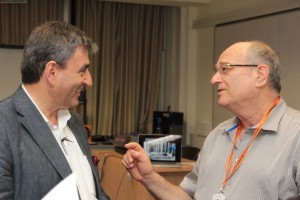Excellence for Excellence
“In my exams students are allowed to turn on their computers and surf the internet”
Prof. Eric Mazur of Harvard University, special guest speaker at the Assessment For Learning seminar held at the Technion, explains why “the current grading method neutralizes curiosity”

Prof. Mazur (left) with Technion President Prof. Peretz Lavie
Photo credit: Yoav Bachar, Technion Spokesperson’s office.
“The Technion values excellence and strives for excellence, and when you want to be in the front row you have to excel in everything – not only in research but also in teaching. This is the mission of the Technion Center for the Promotion of Learning and Teaching, and it is the subject of this seminar, which focuses on assessment.”
With these words, Prof. Gadi Schuster, Executive Vice President for Academic Affairs, opened the one-day seminar on Assessment For Learning, held at the Technion Center for the Promotion of Learning and Teaching on June 24, 2015. Prof. Eric Mazur, Dean of Applied Physics at Harvard University and Minerva Prize winner, delivered the two keynote lectures. “I’ve already been to Israel,” said Prof. Mazur, “but I have not yet visited the Technion and I am very happy to be here, at an institution which – so I read in the New York Times – champions the pursuit of innovation.”
Prof. Mazur spoke about the personal and professional process he underwent over the years as a lecturer in physics. “In 1984, I began teaching a course at Harvard that nobody wanted to teach – Physics for premed students. I did it the traditional way: lectures. The success of my students in tests, and the outstanding evaluations that I received in surveys, concealed the truth from my eyes: this was, and still is, the worst possible way to teach students. Have you ever seen a workplace based on such a situation, in which one person talks and transmits information, and everyone else merely receives it? They do not create, they do not innovate, they do not think and they do not work as a team? A workplace like this does not exist. Nevertheless, that’s what today’s classroom looks like.
“The traditional classroom is based on the amphitheater model – it is basically a show, that’s the message that this situation conveys: the teacher demonstrates and talks, the student listens and doesn’t interrupt. Obviously, not a context that encourages interaction. Imagine if a student raises his hand and says: ‘Mr. Lecturer, could you be quiet for five minutes, so that I can think?’ In other words, we make do with the lowest possible level of educational activity: the transfer of information. What about practice, creativity and thinking? With the traditional approach we are giving up all that and are left with the transmission and reception of information, and for that we teachers aren’t necessary – Google is sufficient.”
In the wake of these insights, Prof. Mazur developed a new approach to peer teaching and assessment in a way that fosters involvement, thinking and interactive learning. “The current grading system harms educational activity, because it punishes the student for his mistakes and neutralizes his curiosity. The road to innovation and creativity is paved with failures, and with the grading system, students are not allowed to fail.”
The teaching method developed by Prof. Mazur mimics real life – teamwork, discussions, intriguing questions and much room for error. “In my exams, students are allowed to turn on their computers and surf the internet – anything but text messages and e-mail. After all, it’s hard to find answers on Google to questions requiring understanding, application, analysis, evaluation and creativity”.
The seminar ended with a panel discussion on grade assessment and management at the Technion, led by Prof. Moshe Baruch, Senior Assistant Vice President for the Advancement of Teaching, with the participation of Dean of Undergraduate Studies Prof. Yachin Cohen, Prof. Daniel Levin of the Faculty of Chemical Engineering, and Prof. Miles Rubin of the Faculty of Mechanical Engineering. The seminar was held by the Technion Center for the Promotion of Learning and Teaching, headed by Dr. Abigail Barzilai, with the assistance of Dr. Irit Wertheim, as part of a program to promote professional standards in the area of assessment and examination in certification courses at the Technion.


